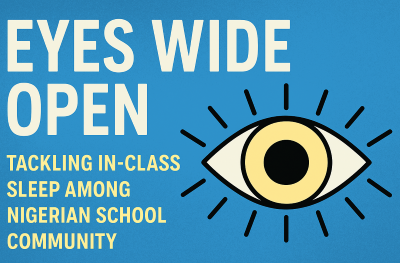In many Nigerian schools, teachers reprimand pupils or students who doze off in class. It is common to find teachers and administrators napping during school hours. Eyes not wide open. Oftentimes, Nigerian schools, direct efforts to tackle in-class sleep within the school community to learners.
Background
Yet, the most frequent sleeper in a school we worked with was not a student or a classroom teacher. The school found the HR administrator dozing off at her desk, sometimes even drooling.
While quietly tolerated, this behaviour speaks to a growing concern in basic education: unchecked fatigue during working hours and the absence of a formal response.
Schools must hold staff to the same standard if they expect attentiveness and discipline from students.
A clearly articulated anti-sleep policy is no longer optional but a professional and administrative necessity.
Hidden Cost of Sleepy Staff Rooms and Classrooms
A sleepy staff sends the wrong message. An administrative role who is consistently asleep during work hours undermines professionalism, erodes staff morale, and disrupts the flow of school operations.
For teachers, classroom napping weakens learning outcomes. For students, it creates confusion and disrespect for school authority.
Basic education is an environment where role modelling is critical and most impressionable.
Allowing staff, particularly HR personnel, teachers, or heads of department, to sleep openly damages the culture of the school.
Understanding the Root Causes
Rather than immediately labelling such behaviour as laziness, schools must consider deeper root causes:
- Poor work-life balance: Many teachers and school staff hold side jobs, face long commutes or carry domestic or undue social responsibilities that stretch late into the night.
- Poor diet: Disrupt a teacher’s sleep discipline. Diets high in sugar and caffeine or heavy meals close to bedtime can lead to restless sleep or insomnia. Skipping meals or poor nutrition can also cause daytime fatigue, making staying alert during school hours harder. Over time, these habits reduce sleep quality and contribute to chronic tiredness, increasing the likelihood of dozing off at work.
- Lack of bedtime discipline: Like students, adults often lack structure around rest and recovery.
- Medical concerns: Conditions like sleep apnea, anaemia, or depression can contribute to chronic fatigue.
- Burnout: Overburdened staff without rest breaks or professional support often crash during the day.
In one real case, a teacher reported a student for sleeping in class. After investigating, the parent discovered the child secretly watched television late into the night.
The family adjusted the child’s bedtime, and the issue disappeared. The lesson: fatigue often has fixable causes – if we take the time to ask.
Why Schools Need an Anti-Sleep Policy
A professional anti-sleep policy does not shame individuals; it reinforces standards and supports accountability.
Anti-sleep policy gives school leaders a framework to address issues constructively rather than allowing the indiscipline of in-class sleep to fester.
A well-crafted anti-sleep policy should:
- Set clear expectations: All staff and students must remain alert and engaged during working hours.
- Define working hours and rest periods: Ensure breaks are scheduled and respected.
- Acknowledge valid exceptions: Schools must carefully resolve health challenges, pregnancies, or emergencies.
- Include a support process: Create space for staff to seek help through HR or school counsellors when fatigue is overwhelming.
The aim is to maintain a professional, alert, and supportive learning environment, not to punish.
Practical Steps for Implementation
- Introduce policy through training: Use staff meetings and onboarding sessions to explain the “why” behind the policy.
- Lead by example: Administrators and senior staff, including HR, must model alertness and professionalism.
- Support wellness: Offer basic health screenings, flexible leave when necessary, and mental and physical fatigue discussions.
- Apply fair consequences:
- First incident: a verbal reminder
- Second incident: written warning
- Third: temporary suspension or reassignment
- Repeated breaches: disciplinary review
- Engage parents: For students, recurring fatigue should trigger a conversation with guardians, not just punishment.
Impact on Students’ Learning
Students lose respect and interest when teachers or school leaders are visibly disengaged or asleep. Teaching is about delivering content and creating energy in the room. Alertness is a foundational part of that.
When students witness inattentive or sleeping adults, they may feel overlooked, unmotivated, or even validated in doing the same. Sleepy staff can start a chain reaction of disengagement and poor academic performance.
Final Thoughts for School Owners and Administrators
School leaders and staff must reflect those values if we want students to thrive in structured, engaging environments.
A formal anti-sleep policy, fairly enforced and compassionately designed, sends a clear message. The school takes learning seriously here, even when you are 6 or 60.
Whether it’s a teacher, pupil, or HR officer, sleep during active school hours should be addressed as a professional and wellness concern. Our schools deserve better. So do our students.
SRJ Legal is the first bespoke education law firm. We complement our education law practice with fintech and commercial dispute (litigation). At the same time, we provide corporate counsel services to businesses and individuals, including families.

